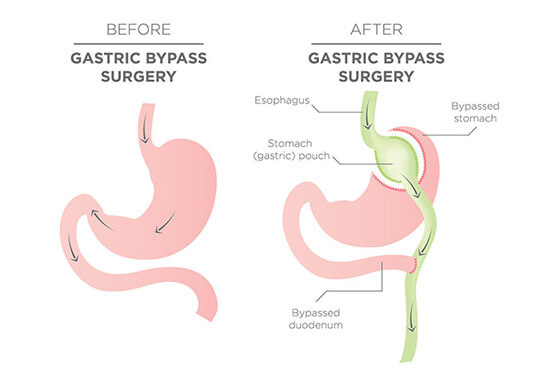
Roux-en-Y Gastric Bypass (RYGB) pronounced “roo-en-why” is the most commonly performed weight-loss procedure. It has been in practice for more than 30 years and provides an excellent balance of weight loss and manageable side effects. The operation can be performed laparoscopically (small incisions to the abdomen) or robotically (computer-assisted surgery used to aid in surgical procedures).
Restriction: The surgeon separates the upper portion of the stomach from the lower portion. The upper portion (or the “pouch”) is then connected to a limb of the small intestine, called the “Rouxlimb.” The new stomach pouch restricts the amount of food you can eat, making you feel full after eating only a small amount of food.
Mal-Absorbtion: Once the smaller pouch is created, the surgeon reroutes your digestive system to bypass the larger part of your stomach and part of your small intestine. The result of the bypass is you absorb fewer calories and nutrients from the food you eat (mal-absorption).
Gastric bypass surgery is known as gold standard of bariatric surgery and is being performed for more than 4 decades.The procedure has strong diabetic and reverses diabetes. The procedure has restriction in form of small pouch and malabsorption of fat and therefore the weight loss results published in long term are excellent. Because the gastric pouch is small and is a malabsorptive procedure patients need vitamins , minerals and protein supplements for lifetime.
Gastric bypass surgeries are the malabsorptive procedures.Hence the patients are advised to consume nutrient dense foods rather than calories dense foods.Fresh foods , salads, fruits rich in vitamins and minerals, protein rich diets like pulses, legumes, eggs , soys, chicken can be consumed. However these are just the broad guidelines one should consult a bariatric nutritionist for a personalised diet as per the body requirements.
Gastric Bypass surgery is a laparoscopic or a keyhole day care procedure in which the laparoscopic stomach is converted into a small pouch and a Y shaped intestine is connected to the stomach pouch. Patients can start working 3 to 4 hours after surgery and start on clear liquid after about 4 to 6 hours after surgery. Once the patient is well hydrated the patient can be discharged. Gastric bypass surgery is the best procedure for reversal of obesity and type 2 diabetes.
Actually after gastric bypass or any bariatric surgery the person is expected to lose about 75-80% of the total excess weight the patient has. The higher the excess weight, the higher the loss each month. Generally in the initial 2-3 months, most patients lose upto 12-15 kgs but if the patients wt is more than 150-200 kgs they can lose more weight in one month. However measuring weight each month may not be necessary because weight loss continues upto one year or more and the person should follow in a bariatric unit with a bariatric nutritionist so that the weight loss can be monitored and accelerated with medications and dietary advice if needed.
Generally a well performed gastric bypass surgery with a good following can give very good long term weight loss results. However there could be some untoward anatomical changes like gastro gastric Fistula or the stomach getting connected to the remnant stomach or dilatation of the pouch in which the patient may need a second correction which is known as revision or redo bariatric surgery. Even though redo or revision bariatric surgery after gastric bypass is less common, whenever it is required it should be performed with only the surgeon's experience in redo bariatric surgery and with a very high volume of surgical procedures, generally a centre of excellence.
The most important factor which needs to be taken into consideration here is nutritional correction. A person needs to follow nutritional evaluation and nutritional supplements after gastric bypass for lifetime. Some of the uncommon complications could be ulcer at the joint between stomach and intestine which is mainly because all smoking, alcohol, spices or pain killers. If any patients needs these for a long time he should seek medical advice and have medication to prevent ulcer formation. The last but not the least gradual weight gain over yours could be a possibility because of compansated metabolism and inability to change the lifestyle completely. Even in that case the person should contact a bariatric nutritionist or a bariatric unit to seek medications to prevent this weight gain further.
Gastric bypass surgery is known as gold standard of bariatric surgery and is being performed for more than 4 decades.The procedure has strong diabetic and reverses diabetes. The procedure has restriction in form of samll pouch and malabsorption of fat and therfore the weight loss results published in long term are excellent. Beacuse the gastric poch is small and is a malabsortptive procedure patients needs vitamins , minerals and protein supplements for lifetimeGastric Bypass surgery is a laparoscopic or a keyhole day care procedure in which laparoscopically stomach is converted into a small pouch and a Y shaped intestine is connected to the stomach pouch. Patient can start working 3 to 4 hours after surgery and started on clear liquid after about 4 to 6 hours after surgery. Once the patient is well hydrated the patient can be discharged. Gastric bypass surgery is the best procedure for reversal of obesity and type 2 diabetes.